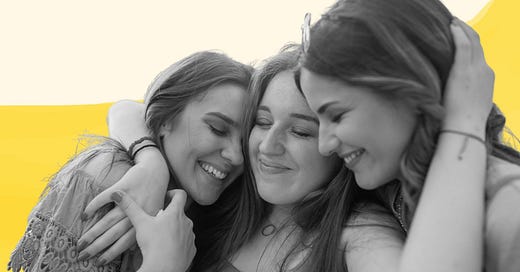Issue #69: The 9 qualities I look for in a friend
Friendships are the relationships that have defined my adult life to date. Here's what I value most in mine.
In the Notes app of my phone, I keep a bulletpoint list titled ‘Friends’. It features around two dozen names, ranging from friends I’ve known since I was 12 to those whom, at very least, I’d be comfortable going for pizza with.
I don’t consult the list often, but it comes in handy when I’m, say, throwing a get-together. It’s also a visual shortcut to remind me, on an off-day, of the rich and varied web of connections I have in my life – especially those friends who aren’t active on social media (of whom there are actually quite a few). When I cast my eyes down the list, I inevitably feel warmer, met with positive memories of cosy dinners; sunny holidays; shared jokes and interests.
Friendships are the relationships that have defined my adult life to date. They underpin my routine. They add novelty and colour. They have shaped my values and world views. My friends aren’t supporting characters, like they would be in a movie; rather, without them, there would be no plot.
Sometimes, in the throes of a new friendship, or after a burst of quality time with an old friend, I’m filled with a giddiness that’s akin to a teenage crush. I find myself quoting things they’ve said, looking up their film recommendations, wondering if I should try out their hobbies. This is, in part, symptomatic of my extroverted tendency to get energised by the people immediately around me. But it also says a lot about the people I have in my life.
Friendships are the relationships that have defined my adult life to date.
I’m in a Golden Era, friendship-wise. That’s not to say I have a million friends or social invitations, or a wide social circle. I don’t. But right now I’m in the luxurious position of being able to prioritise friendship, given that I’m single, childfree and without dependants, live close to central London, manage my own work hours... This won’t be the case forever, but I’m leaning into it while I can.
I get to choose whom I spend time with, in a way I wouldn’t be able to, say, at university, or as a parent at the school gates, or even in a relationship (although I enjoyed having couple friends in the past). As a freelancer in a co-working space, I even get to choose my ‘work friends’. That’s a good approach to take to friendship, according to writer
. In her recent essay, ‘Why I’m so selective with who I spend time with’, Leyla argues – or, more accurately, observes – that we tend to absorb the characteristics of those around us.Who we choose to spend the most time with has a massive sway on us. On our outlook on life, how we think and feel, the expectations we have of ourselves and even how we behave; it’s the reason parents worry about their kids ‘falling into the wrong crowd’. - Leyla Kazim
Which renders it sort of a no-brainer to make conscious choices about our friendships, if we’re in a position to do so.
What do you look for in a friend?
Last summer, I read Elizabeth Day’s book, Friendaholic. What stood out to me most was Elizabeth’s concept of ‘friendship metrics’:
I have learned that we have different metrics of friendship, and sometimes these will be complementary to another person and sometimes they will not. My metric is reciprocal generosity of spirit: the idea that our starting point is always to think the best of each other. My metric is not physical togetherness or shared hobbies or phone calls or quantity of time. - Friendaholic
Might we all benefit from thinking harder about our own ‘friendship metrics’: what we look for from our friendships (and which aspects we don’t care about so much)?
Keep reading with a 7-day free trial
Subscribe to The Shoulds by Francesca Specter to keep reading this post and get 7 days of free access to the full post archives.





